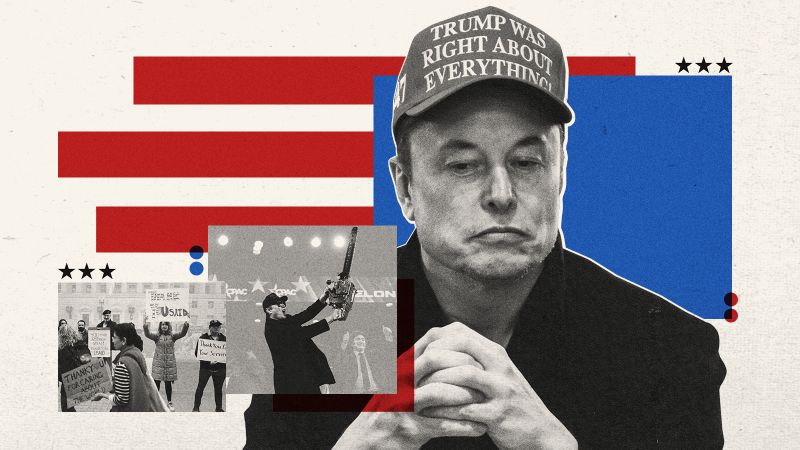In a dramatic display at the Conservative Political Action Conference, Elon Musk took the stage, appearing almost theatrical. Sporting a black baseball cap emblazoned with “MAGA” and dark sunglasses, he brandished a chainsaw while shouting, “This is the chainsaw for bureaucracy!” The atmosphere, charged with fervor from the audience, felt as if Musk had stepped out of a dystopian narrative, reminiscent of scenes from “The Hunger Games.” The spectacle not only underscored Musk’s extravagant personality but also served as an emblem of the political and administrative upheaval that the current administration aimed to instigate.
Musk’s performance was not merely for entertainment; it was a manifestation of the significant financial backing he provided to Republican candidates, totaling over $290 million for electoral victories the previous fall. Under the direction of President Donald Trump, Musk was charged with the ambitious, albeit controversial, task of dismantling the federal government. This endeavor found a formal title in the Department of Government Efficiency, or DOGE, an initiative purportedly established to streamline bureaucracy for the benefit of Americans.
Initially conceived alongside entrepreneur Vivek Ramaswamy, DOGE’s unspoken intention seemed to lean towards radical restructuring. Trump’s words set the stage for a campaign geared toward modifying the federal structure. However, the descriptions surrounding DOGE’s mission hinted at a darker, chaotic transformation that many worried would lead to significant disruptions in federal services. As the team began conducting their operations, reports emerged of Musk and a band of young innovators—one of whom was humorously labeled “Big Balls”—gaining access to federal databases and urging thousands of federal employees to resign or face termination.
The impact was felt not just in cybersecurity and information management, but at ground level. Employees at Yosemite National Park, for example, referred to mass lay-offs as the “Valentine’s Day Massacre.” This event underscored the challenges within an understaffed government, igniting fears of increased inefficiency and work-related stress among those who remained. At the Department of Veterans Affairs, the atmosphere was similarly tense, with employees like Latisha Thompson foreseeing prolonged wait times for veterans seeking medical assistance due to DOGE’s aggressive job cuts.
As the initiative unfolded, the DOGE team’s focus included targeting foreign aid programs. Traditionally, foreign aid has been a contentious point in American politics, and although it represents a minuscule fraction of the budget, it became an early victim of DOGE’s restructuring. Among these programs was the United States Agency for International Development (USAID), which had long been seen as a representation of American soft power throughout the globe. Yet, the DOGE vilified USAID, branding it a “criminal organization,” and rapidly shuttered various aid operations, risking collateral damage to international relationships built over decades.
Despair rippled through the ranks of non-profits and civil servants as many understood that their work would not only cease but was also being painted as criminal. The emotional toll was palpable; Jane, an anonymous aid worker, articulated the heartbreak her colleagues felt at being labeled as unethical. As the DOGE initiative garnered attention, criticisms mounted against its methodology and impact.
Among those voicing concerns was Russell Vought, a former budget official closely associated with Trump, who suggested a policy aimed at instilling fear among federal workers as part of the plan to encourage compliance and reform. His dark musings on the effect of bureaucracy painted a chilling picture for many government workers.
While the acrimony escalated, public perception towards Musk began to shift. His close affiliation with Trump led to serious ethical inquiries regarding conflicts of interest while managing vast government contracts. Despite the frenzy of scrutiny and the ineffectiveness of certain cuts and claims made by DOGE, Musk continued to dominate headlines, bolstered by his deep pockets and the political capital he wielded.
As pressures built, former advisers warned that the precarious situation Musk found himself in could alienate critical voter bases. Open criticism transformed into hostile tensions with concrete incidents of vandalism targeting Musk’s businesses, exemplifying the backlash against his political intertwining. In stark contrast, Trump’s reaction to unfolding chaos around Musk was to bolster him further, drawing an even tighter bond between the billionaire and the administration.
This tumultuous marriage of business acumen and political ambition encapsulated the ongoing battle specter within governmental operations. It raised substantial questions about the integrity of federal services, the future of essential programs impacted by aggressive budget cuts, and the overarching sentiment of those who once supported a vision of governance aimed at serving the public.
Voter sentiment began shifting, with many starting to express regrets over the dismantling efforts undertaken by the administration, particularly as real-life consequences set in for millions dependent on the very programs being dismantled without substantial forethought. The outcome of this pivotal moment in American governance remains uncertain as the implications unfurl, leaving citizens confronting a potential crisis in public service delivery as partisan battles continue to redefine the landscape of federal operations.



